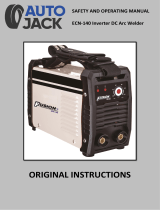
5
7
Additional Safety
Instructions for welders
Welders have many sources of danger. It
is therefore particularly important for the
welder to comply with the following rules
so as not to place themselves or others in
danger and to avoid endangering people
and equipment.
a)
Have all work on the mains voltage
system, for example on cables, plugs,
sockets, etc., performed only by trained
electricians. This particularly applies to
configuring intermediate cables.
b)
If an accident occurs, disconnect the
welding power source from the mains
immediately.
c)
If electric touch voltages occur, switch
off the welding set immediately and have
it checked by an expert.
d)
Always check for good electrical
contacts on the welding current side.
e)
Wear insulating gloves on both hands
for welding. These offer protection from
electric shocks (idling voltage in the
welding circuit), harmful radiation (Heat
and UV radiation) and from glowing
metal and slag spatter.
f)
Wear firm, insulated footwear. Your
shoes should also protect you in wet
conditions. Open- toed footwear is not
suitable since falling droplets of glowing
metal will cause burns.
g)
Wear suitable clothing, do not wear
synthetic clothes.
GENERAL POWER TOOL SAFETY WARNINGS
e) Do not look into the arc with
unprotected eyes, use only a welding
safety shield with the proper safety glass in
compliance with DIN standards. In addition to
light and heat, which may cause dazzling and
burns, the arc also gives off UV radiation.
Without proper protection, this invisible
ultraviolet radiation causes very painful
conjunctivitis, which will only be noticeable
several hours later. In addition, UV radiation
will cause sunburn-type symptoms on
unprotected parts of the body.
f) Personnel or assistants in the vicinity of the
arc must also be notified of the
dangers and provided with the required
protection; if necessary install safety walls.
g) Ensure adequate ventilation for
welding, particularly in small rooms
since the process causes smoke and
harmful gases.
h) Do not carry out any welding work on tanks
that have been used to store gases, fuels,
mineral oil or the like, even if they have been
empty for a lengthy period of time, since any
residue will result in a danger of explosion.























